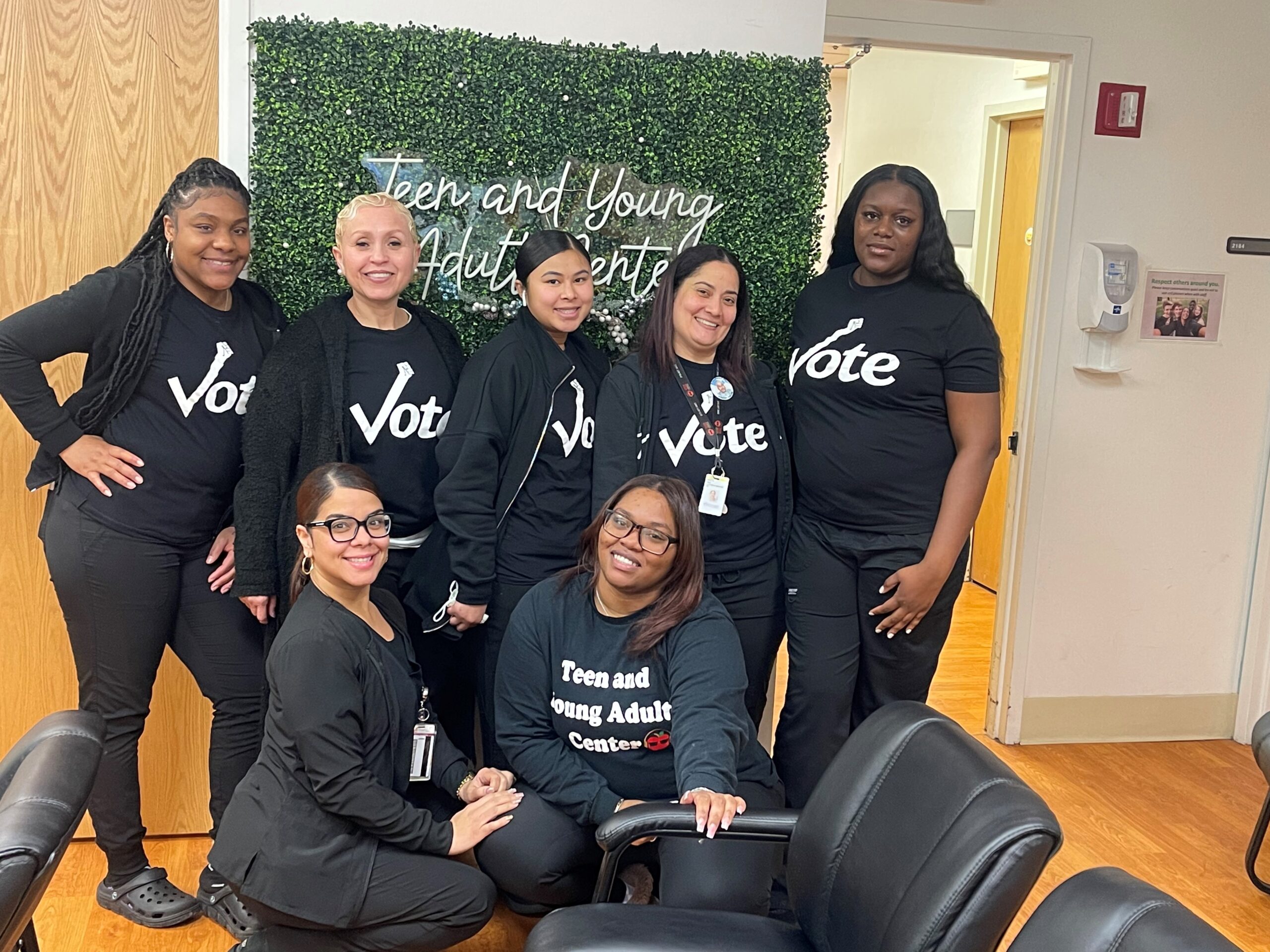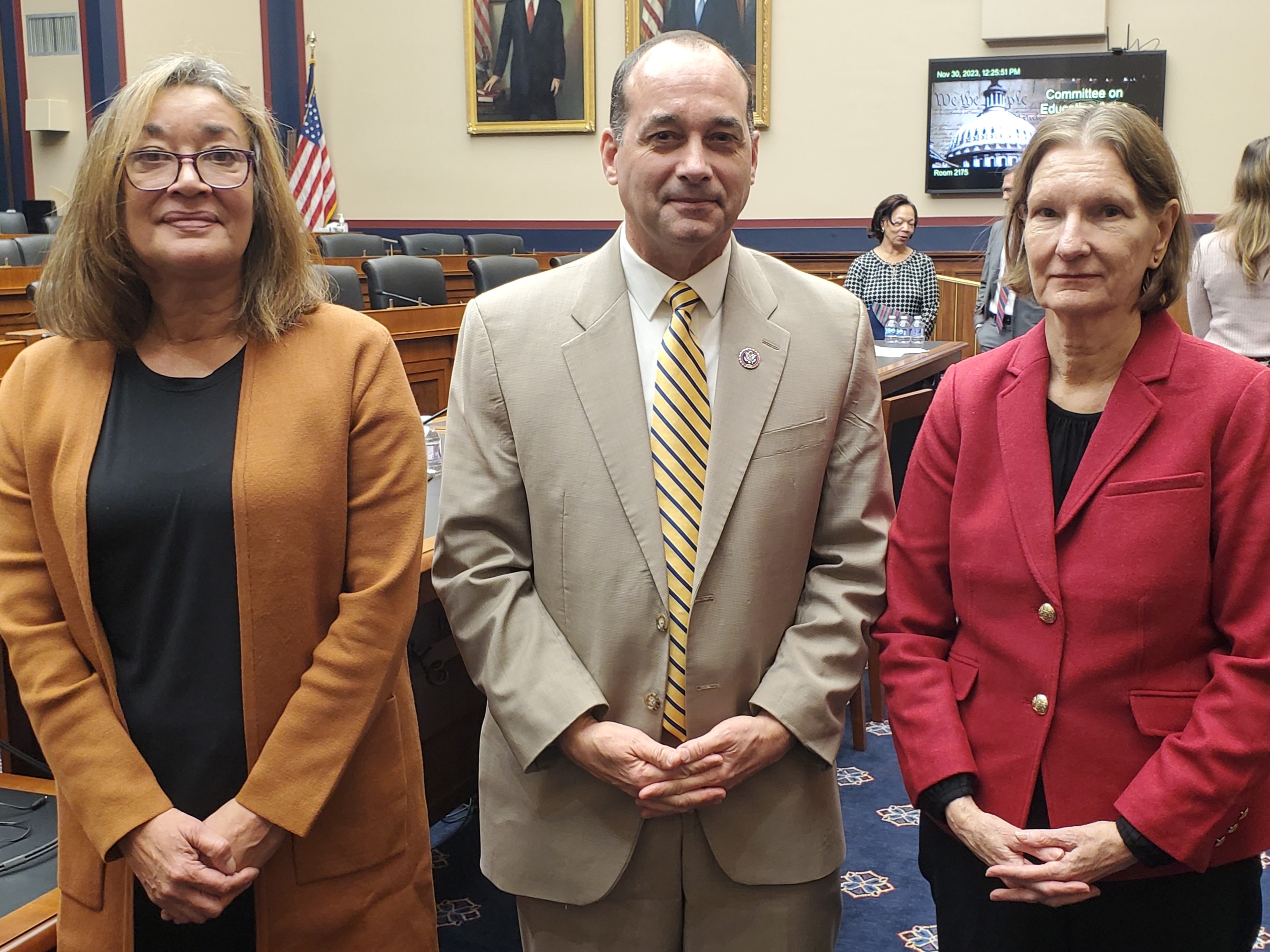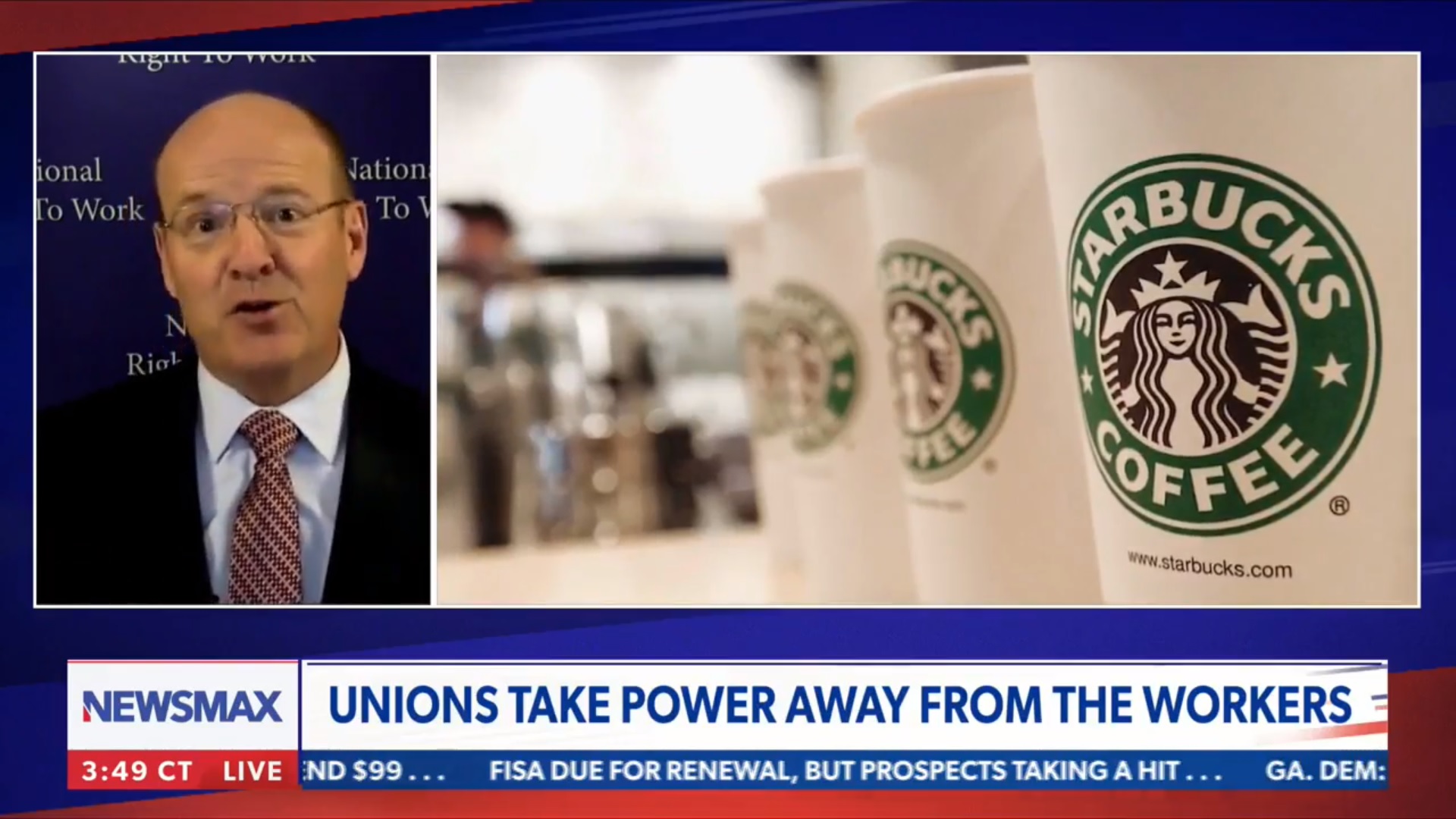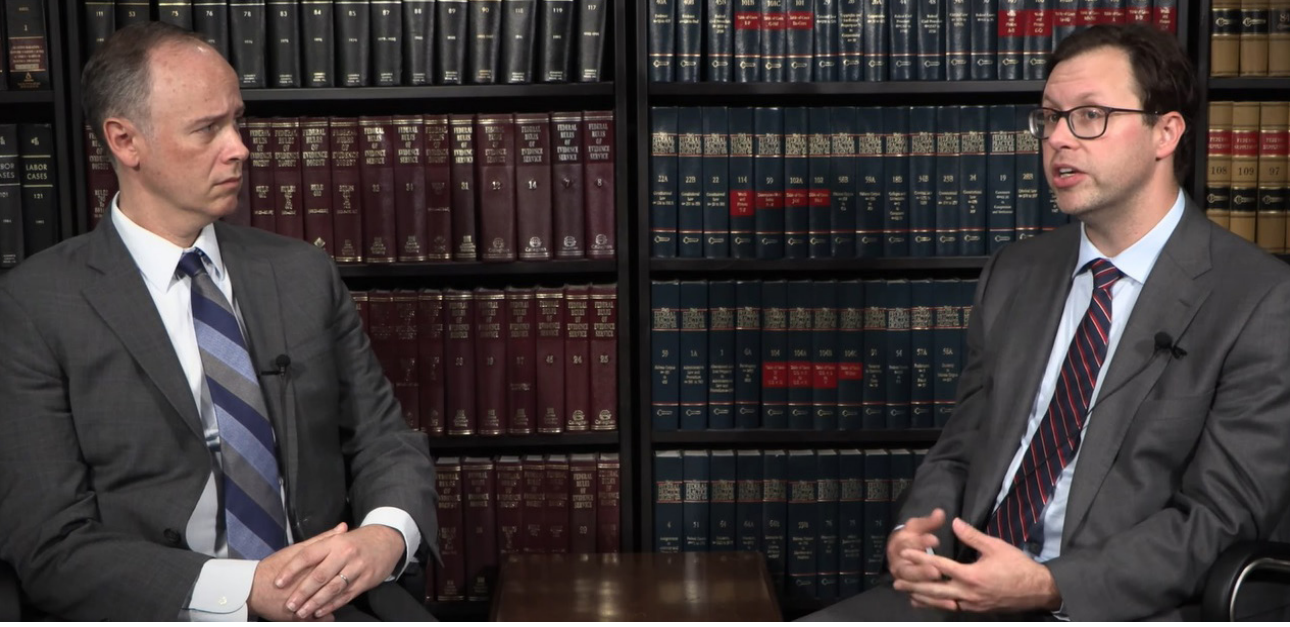Healthcare Employees in PA, MN Oust Unions with Foundation Aid
The following article is from the National Right to Work Legal Defense Foundation’s bi-monthly Foundation Action Newsletter, March/April 2024 edition. To view other editions of Foundation Action or to sign up for a free subscription, click here.
Over 270 workers now free of AFSCME at Philly hospital; Steelworkers union booted in MN
After being told by a union official that “the union isn’t going anywhere,” outpatient service coordinator Shidiah Jackson (back right) and her coworkers led a successful effort to kick the AFSCME union out of St. Christopher Hospital.
PHILADELPHIA, PA – In December 2023, National Right to Work Foundation-supported workers added two new victories to the growing string of successful union decertification efforts around the country.
In Philadelphia, a 270+ worker unit comprised of medical assistants, office coordinators, medical secretaries, and many other support employees voted by a nearly 60% margin to remove the American Federation of State, County and Municipal Employees (AFSCME) union from St. Christopher’s Hospital for Children.
Outpatient service coordinator Shidiah Jackson led the union decertification effort with free legal advice from the Foundation.
In Austin, MN, patient care specialist Erin Krulish and other support workers at the Austin Mayo Clinic location forced Steelworkers union officials out of their facility. That ouster follows multiple recent union removals involving other Minnesota healthcare employees, including nurses at Mankato Mayo Clinic, support staff at Mankato Mayo Clinic, and nurses at St. James Mayo Clinic, all of whom received free Foundation legal aid.
Both Krulish and Jackson kick-started these efforts by submitting decertification petitions to the National Labor Relations Board (NLRB). Each petition contained enough signatures from employees interested in having a union removal vote to prompt the NLRB to hold such a vote.
Healthcare Professionals Free of Monopoly Bargaining and Forced Dues
Both Pennsylvania and Minnesota lack Right to Work protections for their private sector workers, meaning that union officials had the power to enter into contracts with management that would force Krulish, Jackson, and their coworkers to pay union dues or fees just to keep their jobs. In contrast, in Right to Work states, union membership and all union financial support are strictly voluntary.
Steelworkers Officials Depart MN Clinic to Avoid Likely Embarrassing Vote
If a majority of workers vote against a union in a decertification vote or otherwise force a union out, the union loses not only its ability to demand forced dues from employees, but also its monopoly bargaining power.
Such power permits union officials to dictate the contract provisions of all employees in a unit, even those who oppose or voted against the union’s presence in the first place.
The effort by Krulish and her coworkers at Mayo Clinic Austin to remove the Steelworkers union was unique in that they had already stripped union officials of their forced dues power through a “deauthorization election,” which can be petitioned for in the same way as a decertification election. In December 2022, Krulish and her fellow employees voted 49-17 to revoke the union’s power to compel them to pay dues.
Deauthorization is the only way employees in non-Right to Work states can stop a union from seizing dues from workers as a condition of employment, outside of completely decertifying the union.
Krulish and her coworkers resorted to this option because the NLRB’s questionable “contract bar” doctrine prevented them from kicking the union out in December 2022, simply because the union’s contract was still active.
After experiencing a big loss in the deauthorization election, Steelworkers officials likely knew another devastating defeat was coming after Krulish filed her decertification petition. They departed the hospital before the election could take place.
Philly Workers Reject One-Size-Fits-All Union Bureaucracy
In an interview with The Philadelphia Inquirer, Jackson related that she had no contact with the union until she tried to ask for a raise she felt she had earned, at which point hospital administrators said her salary and benefits were a union matter. When she voiced her displeasure with the situation to the union and asked what the union actually did for her, a union official suggested her views didn’t matter anyway because “the union isn’t going anywhere.”
“OK, we’ll see about that,” she told the union agent, according to the Inquirer. Soon after, she proceeded with her decertification effort, which ultimately resulted in the overwhelming vote among her colleagues for ending the union’s so-called “representation.”
“It seems that American medical employees are discovering that union officials’ one-size-fits-all ‘representation’ doesn’t always work to their benefit, nor does it help them take better care of their patients,” commented National Right to Work Foundation President Mark Mix. “It’s easy to see why healthcare workers would want to avoid compulsory dues payments, or being ordered to strike and abandon their patients during a busy time.
“Those in the healthcare industry should know that they have a right to petition the NLRB for a vote to remove a union, and that National Right to Work Foundation staff attorneys can assist them through this daunting process,” Mix added.
DC-Area ‘Union Kitchen’ Employees Vote 24-1 to Remove UFCW Union
The following article is from the National Right to Work Legal Defense Foundation’s bi-monthly Foundation Action Newsletter, March/April 2024 edition. To view other editions of Foundation Action or to sign up for a free subscription, click here.
Foundation now defending workers against union attempt to overturn employee vote
Union Kitchen, a unique grocery concept that helps local DC entrepreneurs get their food products to market, was the target of a dangerous UFCW picket scheme.
WASHINGTON, DC – Ashley Silva, an employee at independent DC-area food store Union Kitchen, could sense in July 2023 that her coworkers had had enough of the United Food and Commercial Workers (UFCW) union in their workplace.
UFCW union officials had been ordering contentious boycotts and pickets on the stores, and some of the demonstrations even required police intervention after union picketers blocked store exits.
“The vast majority of the workers at Union Kitchen are sick and tired of the UFCW’s picketing, harassment of employees, and constant disruptions of our day-to-day work life,” Silva said at the time.
Despite Searing Worker Rejection, UFCW Bosses Trying to Cling to Power
With free legal aid from the National Right to Work Foundation, Silva filed a decertification petition with the National Labor Relations Board (NLRB), asking the federal agency to hold a vote among the employees of Union Kitchen’s five stores on whether the union should be ousted. The vast majority of her coworkers signed the petition.
UFCW union officials levied allegations against Union Kitchen management in an attempt to stop the vote from happening. Despite some delays, Silva and her coworkers cast ballots in October 2023, and a January 2024 vote count revealed that she and her colleagues had voted against the union 24-1.
The union challenged eight employee ballots, meaning the full tally of votes against the union is most likely 32-1.
Once the NLRB certifies this election result, Silva and her coworkers will be free of the union. However, in an attempt to stop this, UFCW officials continue to press the “blocking charges” against Union Kitchen management that they filed at the NLRB before the vote, and have also piled on objections to the election that contain the same basic accusations as the blocking charges.
Blocking charges are often unverified or unrelated charges of employer misconduct that union officials can manipulate to stall a ballot count or a certification of results in a union decertification case.
If the NLRB issues a complaint against an employer based on a union’s “blocking charges,” the decertification process is halted.
Foundation Will Fight UFCW Bid to Overturn Vote
Foundation staff attorneys are defending Silva and her colleagues’ victory at the ballot box from UFCW union officials’ bald-faced attempts to oppose their will.
“We’re happy that Ms. Silva and her coworkers were finally able to exercise their right to vote out a union they oppose,” commented National Right to Work Foundation Vice President Patrick Semmens. “It’s unfortunate, though hardly surprising, that despite such an overwhelming rejection UFCW union officials won’t take a hint and stop attempting to impose their unwanted so-called ‘representation’ on Union Kitchen employees.
“The Foundation is proud to defend Silva and her coworkers against these union tactics as they seek freedom from coercive unionism,” Semmens concluded.
Foundation-Aided Employees Tell Congress: All Workers Need Right to Work
The following article is from the National Right to Work Legal Defense Foundation’s bi-monthly Foundation Action Newsletter, March/April 2024 edition. To view other editions of Foundation Action or to sign up for a free subscription, click here.
Workers’ real-life battles against union bosses emphasize need to end forced union dues
Foundation clients Brunilda Vargas (left) and Jeanette Geary (right) testified to Rep. Bob Good (center) and other members of the House Education and Workforce Committee about the danger forced dues still pose to America’s workers.
WASHINGTON, DC – In November, two recipients of National Right to Work Foundation free legal representation went to Capitol Hill to testify before the U.S. House Committee on Education and the Workforce about their battles against union bosses.
This was the first-ever congressional hearing on the National Right to Work Act, legislation that will safeguard American private sector workers’ freedom to refrain from paying dues to an unwanted union.
Jeanette Geary, a retired nurse, and Brunilda Vargas, a Philadelphia-based public defender, both successfully challenged illegal forced-dues demands with Foundation aid. Their testimony at the hearing, alongside Foundation President Mark Mix, gave policymakers stark examples of how union officials often manipulate their forced-dues powers to advance coercive agendas over the objections of workers.
Vargas, Geary Share Stories of Union Coercion
The current federal law governing most private sector workers in America — the National Labor Relations Act (NLRA) — grants union bosses the power to force workers to pay union dues just to keep their jobs. Only by passing Right to Work laws can states protect workers covered by the NLRA from forced dues.
Meanwhile, airline and railroad employees covered by the Railway Labor Act (RLA) can be required to pay union dues no matter where they work because federal law prevents them from being covered by state Right to Work laws. The one-page National Right to Work Act discussed in the hearing would repeal the portions of both the RLA and NLRA that authorize union officials to require union payments as a condition of employment.
“We’re proud and thankful that Ms. Geary and Ms. Vargas both agreed to testify before Congress on the struggles independent-minded workers face every day because of federal law’s lack of protection for worker freedom,” Mix commented. “Union bosses and their allied politicians don’t want to hear it, but the truth is rank-and-file workers are the victims of Big Labor’s government-granted coercive powers, which makes the stories of those victims especially powerful.”
Geary discussed her struggle against United Nurses and Allied Professionals (UNAP) union bosses, who subjected her and her fellow nurses in Rhode Island to an illegal scheme in which they were compelled to pay for union political expenditures, including lobbying in state legislatures. Geary fought UNAP union officials over the illegal dues demands for 12 years with free legal representation from Foundation staff attorneys. She finally prevailed in 2021, when the First Circuit Court of Appeals unanimously ruled in her favor and rejected a union appeal.
Vargas and Geary: Unions Purposely Hide Rights from Employees
“Unions do not tell employees about their rights because union officials have no incentive to do so, and regular employees without lawyers . . . are left to fend for themselves,” Geary testified before the House Committee. “This is America, and membership in a union and payment of dues should be strictly voluntary.”
Vargas testified about her case against United Auto Workers (UAW) union officials, who threatened to dock the salary of her and any other public defender in her office who refused to let the union seize money directly from their paychecks. Under federal law, even in forced-dues states, union officials must obtain express consent from workers before taking dues money by direct deduction. With Foundation legal aid, Vargas secured a favorable finding from the National Labor Relations Board (NLRB) that initiated a formal prosecution against the union. Eventually, UAW union bosses were forced to settle the matter and end their illegal conduct.
“As attorneys, we do have a level of sophistication when it comes to the law and legal processes. However, I cannot imagine a lay person having to face this type of pressure. I believe that most people sign union membership and authorization cards because they believe they have no choice, and they are often told that,” Vargas testified.
Puerto Rico Union Bosses Try to Dodge Consequences of Janus Lawsuit
The following article is from the National Right to Work Legal Defense Foundation’s bi-monthly Foundation Action Newsletter, January/February 2024 edition. To view other editions of Foundation Action or to sign up for a free subscription, click here.
Worker still battling scofflaw union officials who tried to saddle him with restraining order
PRASA employee Reynaldo Cruz didn’t back down after UIA union officials tried to foist a specious restraining order on him. He isn’t backing down in the face of UIA union officials’ Janus violations either.
SAN JUAN, PR – When Reynaldo Cruz, an employee of the Puerto Rican Aqueduct and Sewer Authority (PRASA), made a Facebook post referring to a chapter president of the Authentic Independent Union of Water and Sewer Authority Employees (UIA) as “lazy,” the chapter president tried to hit him with a restraining order.
“A UIA union official targeted me with a restraining order for daring to speak out against the union, which is my free speech right,” commented Cruz. “That’s ridiculous coming
from union officials who claim to ‘represent’ me and my coworkers.”
National Right to Work Foundation staff attorneys in October 2023 defeated the UIA official’s specious argument that the court should issue a restraining order against Cruz because he
would have had to “stalk” him to know of his laziness. But Cruz’s battle against the UIA union is far from over.
District Court Refuses to Crack Down on Obvious Janus Violations
Cruz is currently challenging a decision by the District Court of Puerto Rico in his years-long case to reclaim dues money that UIA union officials took unconstitutionally from his paycheck.
The District Court made the puzzling move of dismissing Cruz’s suit as “moot” after UIA officials deposited money due to Cruz with the Clerk of the District Court of Puerto Rico. In his motion to alter and amend the judgment, Cruz argues that because the court has not decided any of his underlying claims or entered a judgment in his favor, he has no entitlement to and cannot seek or obtain that money. Cruz is also appealing the District Court’s dismissal of his suit to the First Circuit Court of Appeals in Boston, MA.
“Until the Court enters a declaratory judgment for Cruz, Cruz’s injury-in-fact will persist because Cruz has not received monetary relief and the Court has not entered judgment for Cruz entitling him to the UIA deposit,” Cruz’s motion reads.
Cruz argues in his suit that various provisions of the Puerto Rico Labor Relations Act, which UIA union bosses relied upon to take money from his paycheck, violate the First Amendment. In 2018, the Supreme Court ruled in the landmark Foundation-won Janus v. AFSCME case that public employees have a First Amendment right to opt-out of dues payments to
an unwanted union, and that public employees must waive this right before any dues are deducted from their paychecks.
Cruz’s Janus lawsuit began in 2017, after UIA officials responded to his request to end his union membership and stop dues payments by telling him that he could only cut ties with the union if he left his current job. In addition to naming the UIA, Cruz’s lawsuit also names the Governor of Puerto Rico in his official capacity as Cruz is also challenging the constitutionality of Puerto Rico’s laws authorizing mandatory dues and so-called “maintenance of membership” agreements.
The Janus case was decided as Cruz’s case was ongoing. The Justices definitively ruled that requiring public sector employees to pay union dues as a condition of employment violates their First Amendment free association rights.
The Puerto Rico District Court issued its ruling on October 17, 2023. In addition to not entering a judgment for Cruz deciding his entitlement to the unconstitutionally seized money, the Court also didn’t reach a conclusion on the constitutionality of the Puerto Rico law authorizing mandatory dues payment and membership, nor did it require the UIA union to abandon anti-Janus contract provisions.
Union Bosses Must Be Made to Comply with Janus
“The ruling in Mr. Cruz’s case poses serious issues for public employees across Puerto Rico and across the country,” commented National Right to Work Foundation Vice President Patrick Semmens. “If allowed to stand, it creates a precedent in which workers get no relief when union bosses seize money unconstitutionally from their hard-earned pay, and in which laws that authorize such illegal dues deductions are allowed to stand despite Janus unambiguously prohibiting them.
“Foundation staff attorneys will continue to fight for Mr. Cruz until his rights are vindicated and he gets a judgment awarding him the money he is constitutionally entitled to,” Semmens added.
Foundation Brief Exposes ILA Union Scheme to Destroy 270 Nonunion Port Jobs
Note: After this article was originally published, the Supreme Court declined to hear the case. The following article is from the National Right to Work Legal Defense Foundation’s bi-monthly Foundation Action Newsletter, January/February 2024 edition. To view other editions of Foundation Action or to sign up for a free subscription, click here.
Biden NLRB gutted union boycott prohibition under guise of ‘work preservation’
Despite employing hundreds of both union and nonunion employees and being a big boon to the Palmetto State’s economy, ILA union bosses want to shut down Charleston’s Leatherman Terminal until they gain a monopoly on jobs at the port.
CHARLESTON, SC – Charleston’s Hugh K. Leatherman shipping terminal represents the State of South Carolina’s roughly $1 billion investment to expand the state’s shipping sector. The terminal sports five massive ship-to-shore cranes, which rank among the tallest on the East Coast. Nonunion crane operators — state employees who have handled such work since Leatherman opened in 2021 and for years before that at other port facilities — work alongside unionized private sector employees to keep the port running.
But union bosses of the International Longshoremen’s Association (ILA) think that the port should be effectively shut down until they get control over all jobs at the facility — even the crane jobs that the union’s members have never performed. They’ve backed up that coercive vision by suing any cargo carrier that docks at Leatherman until the union gains control of
all crane lift equipment jobs at the facility. In December 2022, the Biden National Labor Relations Board (NLRB) outrageously ruled 2-1 against a challenge by the South Carolina Ports Authority (SCPA), holding that ILA union bosses’ secondary boycott scheme was lawful. Then the U.S. Court of Appeals, also by a 2-1 vote, affirmed that disastrous ruling.
Foundation Highlights Workers’ Plight After Disastrous Decision
As the U.S. Supreme Court now decides whether to hear the case, National Right to Work Foundation staff attorneys filed a legal brief with the High Court highlighting how the Biden NLRB’s rejection of longstanding precedent will let 270 nonunion state employees at Leatherman be put out of work. That’s despite them having done nothing wrong when performing crane work exactly as they have for years.
“In short, the decisions below, if affirmed, will cause grievous harm to 270 non-union Ports Authority workers and their families,” the brief reads. “The Foundation submits this brief to provide a voice for the otherwise voiceless non-union Ports Authority workers, so the Court has a clear view of the stakes involved for the workers and their families if the decisions below stand.”
Job-Destroying ILA Union Gambit Breaks Federal Law
The brief states that the ILA union’s scheme, if allowed to continue, would require South Carolina to both fire the nonunion state employees of the port, and then turn control of crane jobs over to a private company with an ILA union contract. That’s because South Carolina protects its public sector employees by banning union monopoly bargaining.
If the union’s gambit succeeds, the devastating effects for current employees would go beyond just getting fired. The brief reveals that, even if terminated state workers were to seek new employment at Leatherman with the private company under the union’s control, the ILA would likely give hiring priority to its existing unionized workers above the former state workers under the union seniority provisions and hiring hall referral rules contained in the contract.
“Crane and lift operators who have spent years as non-union Ports Authority employees will likely find themselves at the bottom of any ILA hiring hall list behind the union’s 2,000 current members,” the brief notes.
Additionally, the brief points out that the ILA union’s scheme violates the prohibition on secondary boycotts in the National Labor Relations Act (NLRA), the federal law the NLRB is responsible for enforcing. Secondary boycotts involve union agents targeting a neutral employer (in this case, cargo carriers) in order to win a labor dispute that the neutral employer isn’t even party to.
Finally, the brief notes, by granting the ILA control over the jobs of state employees who have never chosen to affiliate with the ILA, the NLRB is undermining the NLRA’s fundamental premise of employee free choice — the rule that “the employees pick the union; the union does not pick the employees.”
Supreme Court Must Intervene to Defend Worker Rights
“ILA union officials have a well-earned reputation for valuing power over the well-being of workers,” commented National Right to Work Foundation Vice President and Legal Director William Messenger. “While pursuing monopolistic schemes like this that upend the livelihoods of innocent nonunion workers, union agents were also organizing deals in which mob-linked longshoremen from New York and New Jersey could get paid for 27 hours of ‘work’ per day.
“The ILA union’s gambit here should be deemed no less illegal than their interactions with mob members, and the Biden NLRB’s greenlighting such a scheme effectively invites other union bosses to try unlawful secondary boycotts that end with workers and businesses suffering needless harm,” Messenger added.
IUOE Union Bosses Hit With Federal Charge for Illegal Termination
The following article is from the National Right to Work Legal Defense Foundation’s bi-monthly Foundation Action Newsletter, January/February 2024 edition. To view other editions of Foundation Action or to sign up for a free subscription, click here.
Longstanding law protects against mandatory dues deductions, formal union membership
Firestop inspector Alexandra Le isn’t going to let IUOE union bosses snuff out her livelihood over her refusal to join or support the union. She’s filed federal charges with Foundation aid.
PLEASANTON, CA – Sometimes, even the extraordinary power to demand payments from workers under threat of termination isn’t enough for union bosses, who frequently go beyond what is legal to coerce workers into membership and dues payment.
Alexandra Le, an employee of Construction Testing Services (CTS), found herself on the receiving end of such illegal demands from International Union of Operating Engineers (IUOE) officials in October. But Le is now fighting back, hitting IUOE bosses and her employer with federal charges at National Labor Relations Board (NLRB) Region 32 with free legal aid from the National Right to Work Foundation.
Union Misinformed Worker About Rights
Le’s charges state that IUOE bosses got her fired after she rebuffed their demands to formally join the union. Additionally, Le’s charges maintain that union officials unlawfully deducted union dues from her paycheck without her permission and failed to inform her of her right to pay reduced union dues as a non-member — a right secured by the Foundation-won CWA v. Beck Supreme Court victory.
Because California lacks Right to Work protections for its private sector workers, Le and her coworkers can be forced to pay some fees to the union to keep their jobs, even if they’ve abstained from formal union membership. However, as per Beck, in non-Right to Work states, union officials can’t force nonmember employees to pay for union expenses (such as union politics) that go beyond what the union claims goes to bargaining.
Other Supreme Court precedents require union bosses to seek workers’ express consent before deducting dues directly from their paychecks.
In Right to Work states, all union financial support is voluntary and the choice of each individual worker.
Employee Demands Federal Injunction to Reverse Illegal Union-Ordered Firing
“It’s outrageous that IUOE union officials believe they can get me fired simply because I don’t agree with their organization and don’t want to support or affiliate with them,” Le said. “IUOE union officials have been far more concerned with consolidating power in the workplace and collecting dues than caring about me and my coworkers, and I hope the NLRB will hold them responsible for their illegal actions.”
Le’s charge against the IUOE union states that, after she refused to affiliate with the union, IUOE bosses “caused Charging Party to be removed from the work schedule by her Employer as of October 2nd.” The NLRB v. General Motors Corp. U.S. Supreme Court decision protects the right of workers to refuse formal union membership, even in a non-Right to Work state.
As a remedy, the charge asks the NLRB Regional Director in Oakland to “invoke its authority under Section 10(j)” of the National Labor Relations Act (NLRA), which empowers the Board to seek an injunction from a federal court to stop IUOE and CTS management from committing the unfair labor practices.
Workers Need More Protections Against Union Boss Coercion
“Ms. Le’s case shows why Right to Work protections are important,” commented National Right to Work Foundation Vice President and Legal Director William Messenger.
“Even if IUOE union officials had followed federal labor law in this case, Ms. Le would still be forced to contribute to the activities of an organization she clearly doesn’t want to be part of.
“As Ms. Le’s case demonstrates, union bosses often value workers merely as sources of dues revenue and will go to extraordinary lengths to keep the money flowing,” Messenger added. “Workers deserve more protections against union boss coercion, not fewer.”
Tire Wholesaler Employees Force RWDSU Union Out of 15 Locations
The following article is from the National Right to Work Legal Defense Foundation’s bi-monthly Foundation Action Newsletter, January/February 2024 edition. To view other editions of Foundation Action or to sign up for a free subscription, click here.
RWDSU union officials abandon 500+ employee unit ahead of vote at tire wholesaler
Tire-d of the RWDSU: Chris Dorney submitted a huge number of signatures from his coworkers at tire wholesaler Max Finkelstein when petitioning the NLRB for a vote to remove the RWDSU union.
WINCHESTER, VA – The Biden National Labor Relations Board (NLRB), which includes among its members two former union bosses from the Service Employees International Union (SEIU), is pursuing an agenda that hasn’t exactly been making it easy for workers to vote out a union they don’t want. But that hasn’t stopped workers across the country from going to extraordinary lengths to kick out unions that don’t serve their interests.
In October 2023, Chris Dorney, a Winchester, VA-based employee of tire wholesaler Max Finkelstein, kick-started a cross-country effort to vote the Retail, Wholesale and Department Store Union (RWDSU) out of 15 warehouse facilities across the eastern United States. This work unit included more than 500 employees across Virginia, Maryland, Massachusetts, Pennsylvania, New York, New Jersey, Vermont, Maine, and Connecticut.
Virginia Worker Mustered Strong Showing on Petition for Union Ouster Vote at Tire Wholesaler
With free legal aid from the National Right to Work Foundation, Dorney submitted a petition to the NLRB containing more than enough employee signatures to trigger a vote to remove the union from the large unit.
While Dorney and his fellow Virginia employees enjoyed the Right to Work freedom to opt-out of dues payments to the union, the same couldn’t be said for any of the other employees, all of whom hail from states where dues payments can be mandated as a condition of employment. But voting RWDSU bosses out of power entirely at the tire wholesaler would end the union’s forced-dues power.
“We warehouse workers and drivers at Max Finkelstein may be from many different facilities in many different states, but we are in agreement about one thing: RWDSU union officials don’t represent our interests,” Dorney said of the effort. “It’s our right under federal law to challenge RWDSU’s forced representation power.”
RWDSU Bosses Flee Unit as Union Officials Rack Up Losses Nationwide
However, before the vote could occur, RWDSU union officials disclaimed interest in continuing their monopoly representation powers over the unit, likely to avoid an embarrassing rejection by workers at the ballot box.
Unionized workers are increasingly requesting elections to remove unwanted unions — a potential reason for the Biden NLRB’s efforts to crack down on decertification votes. Additionally, union bosses are increasingly losing these contests. As of last year, filings for union decertification votes had shot up by over 40 percent since 2020. Of decertification elections that occurred, the number which resulted in union bosses losing went up by 72 percent.
“Mr. Dorney and his coworkers’ effort to kick out the RWDSU union, which spanned several states, 15 facilities, and hundreds of workers, is yet another example that workers often want to escape union officials’ one-size-fits-all agenda. It’s also a demonstration that workers will go to great lengths in order to exercise this right,” commented National Right to Work Foundation Vice President Patrick Semmens. “But the Biden NLRB, bent on empowering the President’s union boss political allies, plans to grant unions even more power to defeat workers’ will.”
Buffalo Starbucks Barista Counters NLRB’s Move to Trap Workers in Union
The following article is from the National Right to Work Legal Defense Foundation’s bi-monthly Foundation Action Newsletter, January/February 2024 edition. To view other editions of Foundation Action or to sign up for a free subscription, click here.
Appeals Court brief defends workers’ right to oppose and decertify union
As Mark Mix explained on Newsmax TV, SBWU officials spent millions to infiltrate Starbucks with covert union agitators. That led to some of the first unionized Starbucks stores in Buffalo, NY, but now Buffalo baristas are trying to oust SBWU.
BUFFALO, NY – Although the National Labor Relations Board (NLRB) is charged with neutrally enforcing federal labor law, it has a notorious reputation for strengthening union officials’ power while diminishing the rights of workers opposed to union representation. Even with this biased history, the Biden Labor Board has already established itself as the most radically pro-forced unionism board in history.
The NLRB’s ideological bias is most apparent in its massive campaign to impose coercive unionism on Starbucks workers, while repeatedly blocking and undermining Starbucks employees’ attempts to remove unwanted union representation. While agency officials have approved hundreds of petitions for votes to bring the Starbucks Workers United (SBWU) union in, it has not let any of the roughly 20 worker-backed petitions seeking votes to remove the union advance to an election.
NLRB Cites Workers’ Desire to Oust Union as Reason to Impose Union
The NLRB’s anti-worker tactics have reached a new frontier. The NLRB is now citing a petition to remove the union as a reason why the union should not be removed and should serve as the basis for an injunction against Starbucks. NLRB lawyers are asking the Second Circuit Court of Appeals to overturn a District Court ruling and issue an injunction that would force Starbucks to engage in bargaining talks with the union, despite the fact that the decertification petition proves that a majority of employees at a Buffalo, NY, Starbucks want to throw the union out.
The decertification petition in question was collected by Starbucks barista Ariana Cortes. Cortes sought a vote to remove SBWU from her workplace, but the NLRB has refused to conduct the election. National Right to Work Legal Defense Foundation staff attorneys represent Cortes and Starbucks employees in nine other locations where workers are seeking votes to remove the SBWU. Now staff attorneys have filed a legal brief for Cortes and fellow Buffalo Starbucks employee Logan Karam in the Second Circuit Court of Appeals, countering the NLRB’s latest outrageous maneuver.
Cortes’ brief attacks the NLRB’s strategy as condescending toward workers. It argues the NLRB’s view that Cortes’ decertification must be stopped to protect workers is rooted in the wrongful idea that workers cannot think for themselves and lack independent reasons for wanting to get rid of a union.
Foundation Brief: NLRB Denies Workers’ Agency, Free Choice
“In reality, Cortes collected her petition because of the Union’s anti-employee behavior,” the brief says.
Foundation attorneys also contend in Cortes’ brief that what the NLRB is seeking from the Second Circuit — a 10(j) injunction under the National Labor Relations Act (NLRA) that will force Starbucks managers into working with SBWU union bosses to craft a monopoly bargaining contract — is extreme. Such injunctions can only be ordered when the harm done to workers in their absence would be “irreparable.” Foundation attorneys argue Cortes’ and other employees’ attempts to decertify do not make any injuries suffered by the union “irreparable.”
Dangerous Precedent Set If Court Grants Injunction That Undermines Right to Remove Unwanted Unions
If the Second Circuit grants the NLRB’s request for an injunction on behalf of SBWU union bosses, it would be the first time that a federal court has ordered a Starbucks store to engage in bargaining with union bosses on the basis of an employee’s decertification petition.
“The NLRB is digging an even deeper grave for employees trying to exercise their rights to remove an unwanted union from their workplace,” commented National Right to Work Foundation President Mark Mix. “The Board’s attempt to twist the limited employee rights to throw out a union into a reason to force a union upon employees is a new low.
“Ariana Cortes and Logan Karam are taking a courageous stand to ensure their coworkers aren’t disenfranchised and trapped under a union hierarchy they oppose, and we’re proud to support them,” Mix added.
Foundation Lawsuit: Biden NLRB Structure Violates the U.S. Constitution
The following article is from the National Right to Work Legal Defense Foundation’s bi-monthly Foundation Action Newsletter, November/December 2023 edition. To view other editions of Foundation Action or to sign up for a free subscription, click here.
Groundbreaking suit filed for Starbucks employee who was denied vote to oust unwanted union bosses
Starbucks employee Ariana Cortes’ Foundation attorney, Aaron Solem (right), is making a cutting-edge argument targeting the NLRB’s lack of accountability.
WASHINGTON, DC – The National Labor Relations Board (NLRB) is supposed to protect the right of workers to freely choose whether to associate with a union or not. The NLRB is also charged with holding unions and employers accountable when they violate worker rights. Too often, however, it has simply acted as an agency that generates policies to entrench union bosses’ power over workers while shielding union bosses from any kind of liability.
A new federal lawsuit from a National Right to Work Foundation-backed Starbucks employee, currently pending at the D.C. District Court, could upend the federal agency and result in a ruling that the current Labor Board’s structure violates the Constitution.
Employee Challenges NLRB Bureaucrats’ Protections from Presidential Removal
Ariana Cortes, a worker at the Buffalo, NY, “Del-Chip” Starbucks branch, hit the NLRB with the groundbreaking lawsuit in October, contending that the federal agency’s current structure violates the separation of powers mandated by the Constitution.
Cortes’ suit follows Foundation attorneys’ defense of her and her coworkers’ petition requesting a vote to remove Starbucks Workers United (SBWU) union officials from their workplace. Regional NLRB officials dismissed Cortes’ majority-backed petition based on SBWU allegations against Starbucks management that have no proven connection to Cortes and her coworkers’ desire for a union decertification vote.
Cortes’ lawsuit argues that because NLRB members cannot be removed at-will by the President, the NLRB’s structure violates Article II of the Constitution. Under Article II, the lawsuit contends, the President must have the power to remove officials that exercise substantial executive power.
Because the NLRB enforces federal labor law, manages union elections, and can issue legally binding rules and regulations, the lawsuit contends that the agency exercises substantial executive power. Therefore, it falls within the scope of the President’s power to remove officials at will. However, the National Labor Relations Act (NLRA), the law that established the NLRB, restricts the President’s ability to remove Board members except for neglect of duty or malfeasance.
“[T]hese restrictions are impermissible limitations on the President’s ability to remove Board members and violate the Constitution’s separation of powers. Thus, the Board, as currently constituted, is unconstitutional,” the complaint states.
Lawsuit: Unconstitutional NLRB Proceedings Must Stop
Cortes’ new federal lawsuit seeks a declaration from the District Court that the structure of the NLRB as it currently exists is unconstitutional.
“For too long the NLRB, especially the current Board, has operated as a union boss-friendly kangaroo court, complete with powerful bureaucrats who exercise unaccountable power in violation of the Constitution,” commented National Right to Work Foundation Vice President and Legal Director William Messenger. “The NLRB’s operation outside constitutional norms is easily exploited by Big Labor.”
“But as the story of Ms. Cortes shows, the NLRB’s unchecked power creates real harms for workers’ rights, especially when workers seek to free themselves from the control of union bosses they disagree with,” Messenger added.
















Foundation Blasts Biden Plan to Sneak Union Monopoly Power into Agricultural Sector
The following article is from the National Right to Work Legal Defense Foundation’s bi-monthly Foundation Action Newsletter, January/February 2024 edition. To view other editions of Foundation Action or to sign up for a free subscription, click here.
Comments expose DOL rule’s rigging of agricultural visa program to favor union organizers
Julie Su — “acting” secretary of the Biden Labor Department due to bipartisan opposition barring her from the agency’s top job — is overseeing an attempt to sneak union boss power into the agricultural sector against Congress’ will.
WASHINGTON, DC – Federal labor policy in the United States provides a smorgasbord of powers to union bosses in the private sector, not the least of which are the powers to impose one-size-fits-all contracts on dissenting workers in a unionized workplace, and to force workers to pay dues in non-Right to Work states.
Traditionally that hasn’t been the case in the agricultural sector, where each state has the freedom to make its own labor policy. But in November 2023, the Biden Department of Labor announced a rule which could upend this balance and effectively impose on temporary agricultural employees portions of federal labor law that are overwhelmingly favorable to union bosses. The National Right to Work Foundation promptly filed comments exposing the slated rule as a Big Labor power grab.
Biden Admin Defies Congress by Granting Union Bosses Power Over Farmworkers
The proposed rule would assist union bosses with imposing monopoly bargaining privileges over temporary agricultural workers in the United States, including workers who don’t support a union. Among other things, the rule requires that employers fork over employee contact information at union bosses’ request — regardless of whether the union has any employee support. The proposed rule would also cajole employers into entering into so-called “neutrality agreements” with union bosses. “Neutrality agreements” typically require employers to censor information about the union and provide other aid to union bosses in their efforts to collectivize workers.
The comments cite multiple reasons as to why the Department of Labor lacks the legal authority to implement the proposed rule, such as the fact that Congress expressly excluded agricultural workers from federal labor statutes.
According to the comments, the Biden Department of Labor admitted in its rulemaking announcement that it is trying to impose parts of the National Labor Relations Act (NLRA) on
the agricultural sector, despite Congress’ intent.
“The Department not only lacks Congressional authorization to take this action, it is defying express Congressional intent to not subject these types of employees to provisions of the NLRA,” the comments state.
Comments: Union Power Grab Won’t Help Workers
The comments also point out that the provisions in the Department of Labor’s rule are unrelated to the rule’s stated purpose of helping agricultural workers avoid exploitation, and rather resemble a list of proposals to empower union officials at workers’ expense.
“The Department fails to explain how allowing unions to access employees’ personal information, to bargain for neutrality agreements, and to prevent employees from accessing information for and against unionization helps to alleviate the concerns identified in the proposed regulations,” the comments argue.
“The Department should not adopt the proposed regulation,” the comments conclude.
The Department of Labor’s notice of rulemaking comes as the Biden Administration is making a full court press to expand union boss legal privileges across the country. That includes the Biden National Labor Relations Board’s (NLRB) plan to wipe out the Foundation-backed Election Protection Rule, which eased the process by which workers could obtain votes to remove unpopular unions from their workplaces. The Biden NLRB seeks to make it more difficult for American private sector workers to exercise their right to remove unwanted unions, while giving union officials more tools to gain power in a workplace without even a vote.
“Despite the Department of Labor’s claims, the true underhanded goal of this rule is clear: handing union bosses more power to corral workers into union ranks, while cutting back on workers’ privacy and rights to resist unwanted unionization,” observed National Right to Work Foundation President Mark Mix.
“Temporary agricultural workers should not be used as pawns to expand union bosses’ sphere of control into the agricultural sector. But that’s exactly what the Biden Department of Labor is attempting in direct contradiction of the choice made by Congress not to subject such workers to federally imposed monopoly unionism.”